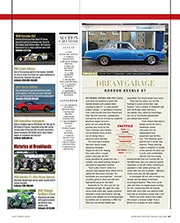
Dream garage – Gordon Keeble GT
Restrained, refined and very quick; such were the qualities to which the Gordon Keeble team aspired when creating its idea of – to steal another maker’s phrase – a ‘gentlemen’s…
HANDICAPS–” TYRESOME” AND OTHERWISE.
WE have always had an inherent dislike for any form of handicap in a speed event. To our mind
there is no sport attached to a struggle against the arbitrary calculations of a mathematician, since a w.n depends on either somebody else’s misfortune, a miscalcalation by the handicapper or a successful hoodwinking of the latter by the competitor. At Broo’dands, where every driver is given his turn during the year, and where close finishes must be staged to please the public, we suppose nothing can be done, but it does seem a scandal that our one great road race, the Ulster T.T., should be marred by this pernicious System,
Here we have a long distance road race caiering for five different sizes of car, yet the only important award is decided by an arbitrary handicap which credits the smaller cars with a number of laps at the start. There is no award for the fastest car, irrespective of class.
Now, on a tortuous road circuit, it is extremely doubtful whether a heavy car of some five litres capacity can lap as fast as a nippy 1,500 c.c. supercharged car, yet the latter is credited with a start of no less than 27 miles. The ‘,too c.c. cars have an even greater start, in spite of the acknowledged fact that on a circuit of this sort they should be almost as fast as any.
Another heavy handicap imposed on the large cars is found in the tyre regulations ; only two spare wheels are allowed for each car and only one is to be on the car. This at once necessitates twice as many pit stops for the heavy cars, which do not stand an earthly chance of completing the whole 400 miles without changing at least both back tyres. The light cars, on the other hand, might quite easily run through with one set of tyres. Again, this regulation has caused the abstention of one most interesting team who find it necessary to use different size tyres on front and rear of the car, and wto know from experience that all four wheels would have to be changed in a race of this length.
This is not an International Regulation, and it seems a great pity that our first great post war road race, wb.lch is announced as an International event, should be Spoiled by such unfair and, withal, pointless conditions.
Though it is hardly credible, it certainly looks as though the organisers are trying to ensure a victory on the part of a certain type of car (admittedly popular in this country) by hopelessly handicapping its rivals.
By far the fairest way of running the race, though we suppose the organisers are adamant, would be for the premier award to go to the fastest car, irrespective of class, a secondary award to be decided by the existing handicap, and subsidiary prizes given to the various class winners, the whole race to be run on genuine International Rules.
The two complaints mentioned above have already caused the withirawal of entries by two firms, who may safely be said to be the respective leaders of their particular branch of the industry, in Germany and Great Britain. Thus, it would seem that our remarks are not unjustified, since such an element of interest has already been eliminated from what might be a very fine race,